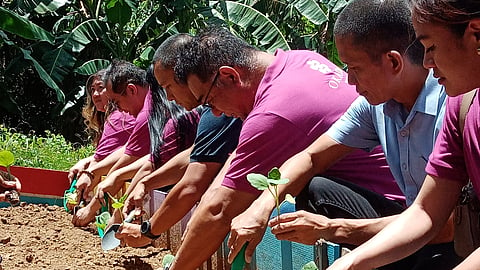
- NEWS
- the EDIT
- COMMENTARY
- BUSINESS
- LIFE
- SHOW
- ACTION
- GLOBAL GOALS
- SNAPS
- DYARYO TIRADA
- MORE

Planting an eggplant seedling at high noon in the vegetable farm of the Gawad Kalinga (GK) village in Barangay Hugo Perez, Trece Martires, Cavite reminded Kenji Sugiyama of his childhood days in his hometown in Hokkaido, Japan. The board member of Okada Manila resort hotel remembered his then farmer neighbors bringing produce to their house as gift. The helpful farmers made Sugiyama glad to emulate them as the planting symbolizes his company’s support to a farming revolution initiated by the School for Experiential and Entrepreneurial Development Philippines (SEED).
The planting of the eggplant seedlings by Sugiyama, GK executive director Daniel Bercasio, SEED director Mark Lawrence Cruz, Okada Manila staff and press people last 22 May was symbolic of their partnership and the school’s initial successes made possible by the generous donation from the hotel resort in Parañaque City. After all, the half million pesos given by Okada Manila to SEED funded the training of its scholars in building new farms across the country.
“At Okada Manila, we believe that real impact begins when we extend our efforts beyond our property and into the communities we serve. Through our partnership with SEED Philippines under the Okada Green Heart program, we are proud to support young people in pursuing a good education and hands-on training, investing in future leaders who will help shape a more food-secure and inclusive Philippines,” Sugiyama said at the immersion event and ceremonial hand-over of the donation.
“This immersion is more than symbolic. It’s a reminder that lasting change happens when we learn from one another, work together, and empower the next generation to lead with heart and purpose. Thank you for having us, and we look forward to continuing this meaningful journey with all of you,” he told villagers who hosted the event as well as SEED scholars.
Okada Green Heart is a comprehensive sustainability program at Okada Manila, focusing on reducing environmental impact, promoting sustainable development, and fostering community well-being. Aligned with the United Nations’ Sustainable Development Goals, the program has various areas, including energy efficiency, waste reduction and sustainable sourcing.
Sugiyama shares Cruz’s observation that there are many idle lands in the Philippines that the people can turn into farms and monetize.
“It is one hope to escape from poverty,” he said.
SEED is not getting just a one-time donation from Okada Manila. Sugiyama promised continuous support for its scholars just like how it sustains other educational projects. It is the company’s way of giving back to the Philippines for the business opportunity given to Okada Manila, he said.
Promoting food security
SEED’s scholarship program is more than just providing education to the youth to improve the standard of living of their families.
“We want to make the average age of the farmer younger,” Cruz said.
The average age of farmers in the Philippines is 65, according to the SEED director. Without new and younger farmers taking over from them, food production would be affected.
Since its inception 10 years ago, SEED has produced 800 farmers with an average age of 21, Cruz said.
He thanked Okada Manila for helping SEED’s first batch of 32 scholars in the Visayas region to complete their agricultural training.
“Because you helped us send them to school, they have since then, many of them have worked in the agricultural offices of their municipalities,” Cruz said.
“So they are practicing what they learned. Many of them are also hired by us. They’re building farms all over the country,” he added.
The batch supported by Okada Manila were able to built six farms during their training period.
The other SEED scholars have gone to college on their own, without our scholarship help. They have pursued four-year courses on their own.
“So we have sparked their love for education all over again. And so not only did you provide scholarships, but you provided a fresh start for the journey of those 32 people,” according to Cruz.
Cruz revealed that around 2,500 public school principals and teachers are going to Bacolod to see the SEED’s successful formula.
“They want to see what we’re doing in agriculture because they’re not seeing that. Government schools in agriculture are closing down. Gawad Kalinga is opening up. We are building six (schools), and we want to build one school in every region. Our commitment to this country, we will build the next generation of young farmers so that when you go drive around the Philippines, you will not see any empty land. Just like in Japan, every piece of productive land is farmed,” Cruz said.
Partner vs poverty
It’s not surprising for Okada Manila to support Gawad Kalinga as the community organizer also works to eliminate poverty in the Philippines.
“The way to end the cycle of poverty is to create platforms so that we could change the trajectory of the lives of the families,” GK executive director Daniel Bercasio said at the event.
“But the more important thing is each community should be a platform for convergence because we cannot do it alone, and we need the help of everyone. That’s why every GK community you see is a cross-section of people working together towards the same goal.”
Bercasio said that aside from building communities like the 14-year-old GK village in Hugo Perez, GK is addressing the problem of illiteracy and food insecurity.
“That’s why we will be starting here, but this will impact a big area in Cavite, where we will see communities growing their own food,” Bercasio said.
He thanked Okada for helping empower the community to be changemakers in their immediate environment.
